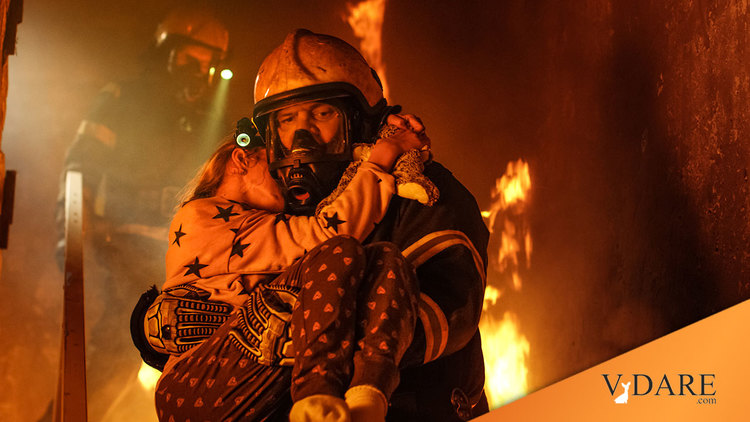
By Steve Sailer
02/22/2010
From the AP:
The Supreme Court on Monday seemed willing to let a group of African Americans sue Chicago for discrimination over a hiring test that weeded out black applicants to become firefighters.It is the second time in as many years that the high court has tackled discrimination in testing within the firefighting ranks. In a landmark case last year, the Supreme Court in a 5-4 decision said New Haven, Conn., violated white firefighters' civil rights by throwing out an exam in which no African-Americans scored high enough to be promoted to lieutenant or captain.In Monday’s case, the city of Chicago decided to use a test to weed out potential firefighter trainee applicants. Anyone who scored 64 or below was deemed not qualified. But the city set a second cutoff score of 89 points.
Officials told applicants who scored below 89 but above 64 that although they passed the test, they likely would not be hired because of the large number of people who scored 89 or above. The majority of those in the top-scoring group were white; only 11 percent were black.
"Chicago used an unlawful cutoff score to determine which applicants it would hire as firefighters," said John Payton, director of the NAACP Legal Defense and Educational Fund. "There is no dispute that the cutoff score had an adverse impact on qualified black applicants and was not job-related."
However, the issue before the court was whether the aspiring black firefighters waited too long to sue. People are supposed to sue within 300 days after an employment action they seek to challenge as unlawful.
The city says the clock started when it announced the use of the test scores in January 26, 1996. The first lawsuit in the case was filed on March 31, 1997, 430 days after the city announced the results.
But the plaintiffs say a new act of discrimination also happened each time the scores were used in hiring firefighter trainees between May 1996 and October 2001.
A U.S. District judge agreed with the black applicants, but the 7th U.S. Circuit Court of Appeals overturned that decision. The federal appeals court said the limitation period began when the city placed the applicants into the middle tier.
"And after that decision was made, there was nothing else that Chicago did that affected petitioners in the terms required by the statute," city lawyer Benna Solomon argued. "Hiring others did not adversely affect petitioners."
But "what is the list, other than an administratively convenient way to use the scores?" Justice Ruth Bader Ginsburg asked.
Added Justice Sonia Sotomayor: "When you hire, aren’t you acting upon the results?"
Deputy Solicitor General Neal Katyal argued that if the court allows the city of Chicago to hire using its flawed method, that will tell employers they can get away with a discriminatory test if they manage to avoid a lawsuit within the 300-day limit .
"If the rule of the city of Chicago were adopted, then an employer who made it 300 days without an EEOC charge being filed … would then be able to, for all time, use that discriminatory test," Kaytal said.
The court is expected to make a decision before fall.
The case is Lewis v. Chicago, 08-974.
This is not an obscure case: Mayor Daley put the city through contortions in the 1990s to come up with racially fair fire and police test, and was shocked when whites always did so much better on them.
Will anybody nationally come to the defense of the Chicago firemen most qualified to save lives?
This is a content archive of VDARE.com, which Letitia James forced off of the Internet using lawfare.